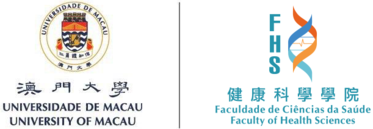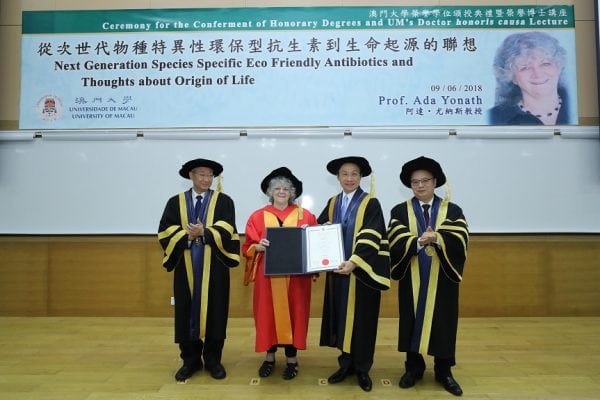The University of Macau (UM) today (9 June) conferred the Doctor of Science honoris causa degree on Prof Ada Yonath, a Nobel laureate in chemistry, in recognition of her studies on the structure and function of ribosome as well as her outstanding contributions in the field of biomedical sciences. At the event, Prof Yonath gave a lecture titled ‘Next Generation Species Specific Eco Friendly Antibiotics and Thoughts about Origin of Life’, in which she shared her latest research findings with the audience.
Tam Chon Weng, secretary for social affairs and culture and representative of UM’s chancellor, presented the honorary degree to Prof Yonath, in the company of UM’s University Council Chair Lam Kam Seng and UM Rector Yonghua Song. Chuxia Deng, dean of UM’s Faculty of Health Sciences (FHS), delivered the citation for Prof Yonath. In the citation, Prof Deng said, ‘Born in Jerusalem, Prof Yonath is a world-renowned specialist in crystallography who cracked the mystery of ribosomes. She has been very inquisitive about why the world works the way it does, and it is with this curiosity that she questioned how ribonucleic acid (RNA) chains and proteins react in every cell in such a way as to present the life as we know it. Questions of this kind pique her interest for constant scientific explorations.’ He added, ‘In the early 21st century, she succeeded in obtaining complete atomic structures of ribosomal subunits in high-resolution and studied the modes of action of more than 20 types of antibiotics which target ribosomes. She analysed various modes of antibiotic-binding and inhibitory, as well as the mechanics of drug resistance and drug synergism by studying the crystallographic structures of ribosome-antibiotic complexes. Some pathogens are resistant to antibiotics, thus making the latter lose their efficaciousness against bacterial infections. Therefore, sustaining its efficaciousness is a very important task for medical scientists.’
In his speech, Rector Song said, ‘As a world-renowned scientist and expert in ribosome research, Prof Yonath’s research is highly influential to the medical sector, and has significantly promoted the development of new medications for improvement of the overall living standards of human mankind. Prof Yonath was a member of the International Advisory Committee of the University of Macau, and is currently a member of the advisory board of FHS. As a young university undergoing expansion in research and teaching, all of us at UM are very thankful to renowned scientists and experts like Prof Yonath who spares time to share their research experience with our faculty members and to give advice on the development of the faculty. Indeed, in recent years, through the effort of the university community, growing regional and international collaborations, and inviting world-renowned scholars to visit and collaborate or to deliver lectures and talks in our university, we have made several breakthroughs in various fields. Also, our progress is being recognised in world university rankings such as QS and THE in recent years. Hence, we will continue to work hard to create conditions favourable for the steady growth and development of the university and will devote more effort to attracting top scholars, establishing research facilities, conducting interdisciplinary research, etc. We hope to see more distinguished experts and researchers visiting Macao and the University of Macau in the near future.’
In her lecture, Prof Yonath pointed out that resistance to antibiotics is a severe problem in modern medicine. The resistance is a basic process for the survival of many microorganisms, regardless of their exposure to modern clinical treatment and/or nutrition. We are reaching a ‘post antibiotic era’ as called by the World Health Organisation. Consequently, the World Bank estimates that up to 3.8 per cent of the global economy will be lost by the year 2050 because of the resistance to antibiotics. However, Prof Yonath said that very few new antibiotics are in development, and most large pharmaceutical companies have stopped trying to develop new antibiotics owing to the huge mismatch between the social value of new antibiotics and the high expense needed for creating them. ‘Bacteria “want” to live and because bacteria are “cleverer” than us, at least in terms of survival,’ she said. ‘We are aware of the problematic economical issues associated with pathogen-specific antibiotics. Nevertheless, we expect pharmaceutical companies to consider human aspects, not only profits. It is possible to increase antibiotics effectivity: more potent antibiotics can be made.’ Prof Yonath added that scientists can design antibiotics with desired properties that can be optimised in terms of their chemical properties, toxicity, penetration, species-specificity, thus preserving the microbiome. They can also be optimised in terms of bio-degradability, thus reducing the ecological hazards caused by the spread of the current antibiotics’ non-degradable metabolites. In all modern ribosomes, the internal active site, where peptide bonds are formed, seems to be a remnant of a prebiotic bonding apparatus, which evolved and optimised together with the introduction and development of the genetic code, its products, the proteins, and the ribosomes.
The event attracted more than 100 people from at home and abroad, including experts, scholars, professors, researchers, and UM faculty members and students. Attendees seized the opportunity to discuss issues related to the optimisation of antibiotics and development of new drugs. Prof Yonath also attended the Fifth Symposium on Biomedical Sciences organised by the FHS, where she shared her research experience and exchanged ideas with scientists in the field from around the world.


